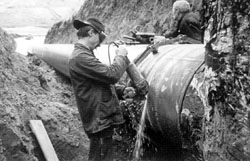The Cabinet is late in attracting oil and gas investors

The fourth special oil-and-gas exhibit, opening in Kyiv on October 24, was in a way a strictly interdepartmental affair. In any case, experts from other industries wishing to explore the display and perhaps make contact with people in the field were not admitted. Meanwhile, the event, including a presentation of the Ukrainian sector of the Eurasian Odesa-Brody oil transport pipeline and Pivdenny Oil Terminal, reached far above and beyond any department. Oil and gas problems keep the Ukrainian economy tense now that the winter is approaching. The Cabinet, mainly by means of eloquence, has been patching up energy holes since the start of the heating season.
However, this is precisely the attitude of The Day’s expert to what Vadym Kopylov, chairman of the board of the Naftohaz Ukrayiny National Company, had to say on Turkmen natural gas supplies to Ukraine beginning in November. Being also First Deputy Minister of the Fuel and Power Industry, his statements ought to be received with a greater degree of trust, but there are serious doubts. Mr. Kopylov said nothing about an insurance fund and prepayment for Turkmen gas, as per agreements signed by Leonid Kuchma in Ashgabat. Instead, he described an “effective transaction” (i.e., gas procurements from Turkmenistan, courtesy of Interfax Ukraine) allowing Ukraine to pay $54 per thousand cu. meters at the Russian- Ukrainian border. However, an informed source in Moscow told the agency that gas bought in Turkmenistan and crossing Russia will cost $30-35 per thousand cu. meters. In other words, when crossing the Ukrainian frontier, it will sell at $80 per thousand cu. meters.
Needless to say, Premier Yushchenko was the key figure taking the floor at the oil and gas exhibit. Previously, in an interview with The Financial Times, he said that Ukraine was finally prepared to allow Gazprom and Western importers to buy an interest in the Ukrainian gas transit pipeline, and that it would have multilateral talks to discuss the transfer, including possible concessions to private companies. Now he switched to the oil subject and again demonstrated corrections in his own guidelines which only recently boiled down to barring foreign investors access to the Ukrainian sector of the oil transport corridor. This time the Premier gave the investors a whistle, specifying that only the first two to cross the finish line would take part in the completion of the oil pipeline.
One of the participants in the presentation, meant to find creditors to fill the pipeline with oil, hinted to The Day that the government would actually keep foreign investors away from this drawn-out Ukrainian construction project. Otherwise such investors would receive a 70% stake in the oil terminal, currently a rather risky venture. The Polish sector and the pipeline from Brody to the Polish border are a different story. Works are still to begin there. Here the Cabinet is all out for Western investors.
Mr. Yushchenko announced that Ukraine plans to announce a new transit policy, which is supposed to be so convincing as to make Russia discard its bypass project. The Premier correctly pointed out that “Ukraine’s considerate and proper conduct during the talks will be of crucial importance.” He made no mention of any of the gas pipelines from Turkmenistan, bypassing Russia on the bottom of either of the seas, a project recently initiated by his Vice Premier.
Polish President Aleksander Kwasniewski declared that same day that his country could allow Russia to lay the pipeline across its territory and promised that Ukraine would also partake of the project’s economic benefits.
A reliable source at the Ministry of the Fuel and Power Industry told The Day that what Ukraine has so far from Poland is its intent to “agree (to participate in the completion of the pipeline from Odesa to Western Europe), but no specific actions.” Nor has the much-advertised (mainly in Kyiv) presentation yielded any tangible results. As for those willing to fill the Ukrainian pipeline with oil (on rather vague terms and conditions), none have been registered to date. Some European firms operating in Kazakhstan have been rumored to have shown interest, but no names have been cited thus far.






